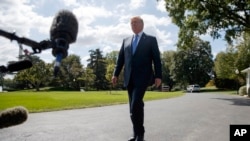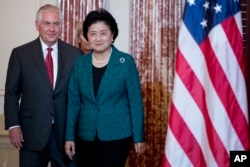U.S. President Donald Trump will embark on a trip to Asia in November with the goal of garnering global support against the North Korean threat, while attending regional summits and discussing trade, the White House announced Friday.
"The president's engagements will strengthen the international resolve to confront the North Korean threat and ensure the complete, verifiable, and irreversible denuclearization of the Korean Peninsula," the statement said.
The trip will include the president's first visit to China, North Korea's closest ally and number one trade partner.
Secretary of State Rex Tillerson will pave the way for Trump's trip to China on his second trip to the country next week by seeking Beijing’s cooperation on a “maximum pressure” campaign against North Korea’s nuclear aggression, amid heightened tensions on the Korean Peninsula.
The U.S. is conferring closely with Chinese officials on Beijing’s commitment to curbing imports of North Korean coal, iron, iron ore, lead and lead ore, and seafood.
If fully implemented, the ban on those items could substantially reduce North Korea's revenues this year, after earning $1.5 billion from the export of these items to China in 2016, according to the U.S. State Department.
Trump will attend the U.S.- Association of Southeast Asian Nations (ASEAN) summit and the East Asia summit in the Philippines. His travels also will take him to Vietnam for the Asia-Pacific Economic Cooperation (APEC) summit.
Vice President Mike Pence said Thursday in Jakarta, Indonesia, the U.S.-ASEAN relationship is a "strategic partnership" and that ASEAN has "promoted prosperity and security" not only among member nations, but also throughout the Asia-Pacific region.
The exchange of goods and services between the countries also will be a priority for Trump. The White House said the president will stress "the importance of fair and reciprocal economic ties with America's trade partners."
Trump's November 3-14 trip will include visits to South Korea, Japan and Hawaii.






